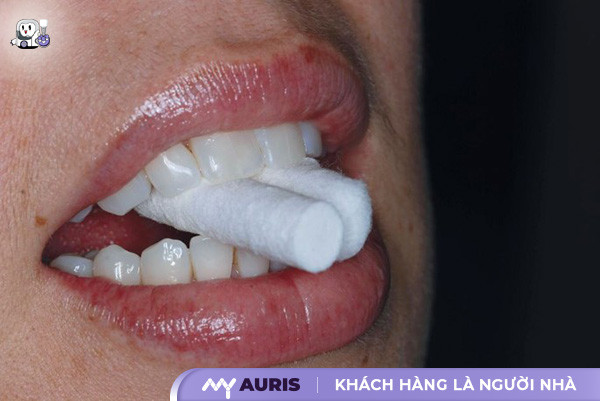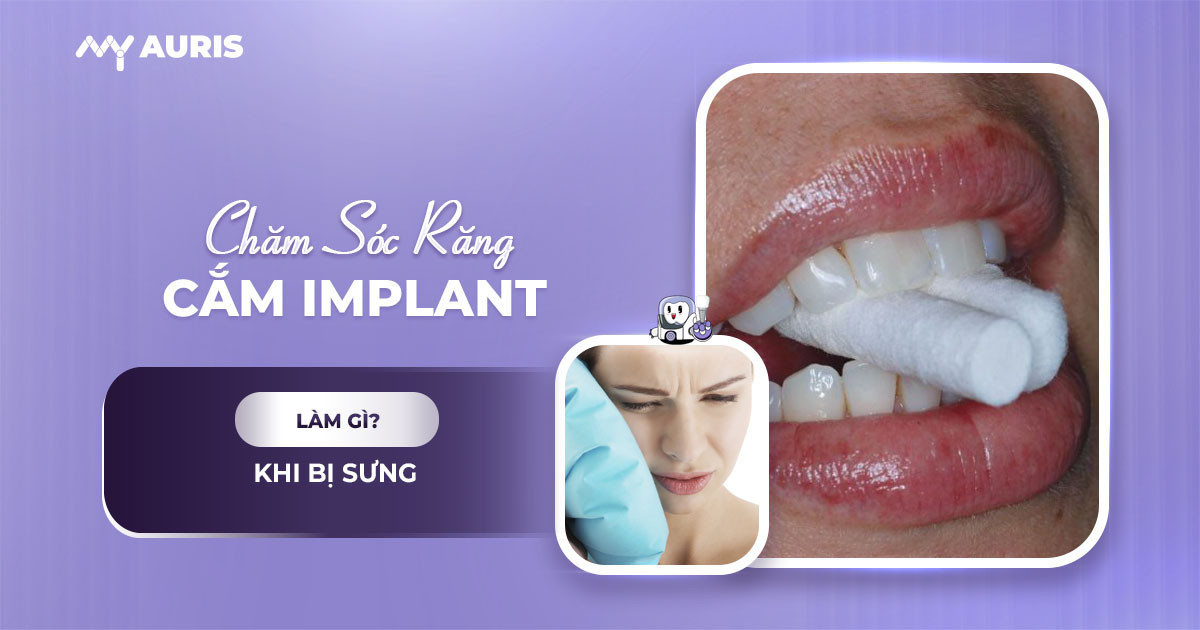Proper implant dental hygiene and implant maintenance are decisive factors for treatment success; good maintenance of dental implants will help prolong their lifespan. This article from My Auris guides post-operative care, providing a detailed care process to help dental implant patients understand how to protect their implant posts and ensure long-term oral health.
Proper Oral Care Instructions After Dental Implant Placement
After implant placement, the dentist will drill into the jawbone to insert the implant post, creating a small wound at the implant site. Post-surgery, patients may experience mild bleeding, swelling, and pain – normal bodily reactions. To alleviate pain, prevent infection, and facilitate better bone integration with the implant post, strict adherence to the post-implant care regimen outlined below is essential:

Stopping Bleeding by Biting Down on Cotton Gauze
Bleeding after dental implant placement is normal. Patients should bite firmly on a cotton gauze for about 30 minutes after surgery to help the blood clot. During the first 1-2 days, slight oozing of blood may still occur. However, if the bleeding is excessive or prolonged, visit the dental clinic immediately for the dentist to address it, to avoid affecting your health and the implant post.

Reducing Swelling and Pain with Cold and Warm Compresses
When the anesthetic wears off, patients may experience swelling and pain after implant placement. For the first 3 days, apply a cold compress externally to the swollen cheek area to reduce inflammation. From day 4 onwards, a gentle warm compress can be applied to help dissipate bruising and promote faster wound healing.

Take Medication Exactly as Prescribed by the Dentist
Many people do not take medication at the correct dosage or self-medicate with over-the-counter painkillers, which can easily cause side effects or lead to implant rejection. Taking prescribed medication helps control inflammation and prevent infection. Note that medications containing Aspirin are usually avoided as they can cause prolonged bleeding.
Appropriate Diet After Dental Implant Placement
Initially, pay close attention to your diet after implant placement. You should eat soft, liquid, easy-to-swallow foods such as porridge, soup, oatmeal, milk, smoothies, or juice. After 2 weeks, you can resume normal eating but should limit vigorous chewing and avoid biting hard foods.
The list of foods to avoid after dental implant placement includes:
Coffee, alcohol, carbonated drinks, sweets like candies, cakes, ice cream…
Spicy, hot, hard, chewy, or highly acidic foods like sour fruits.
Absolutely no smoking for 4–6 weeks as toxins in tobacco increase the risk of implant rejection.

Proper Oral Hygiene
Oral hygiene after implant placement is a crucial factor for rapid recovery:
Brush gently twice a day with a soft-bristled toothbrush or a specialized toothbrush for implant patients.
Use dental floss to clean around the implant post and between teeth to prevent peri-implantitis.
Use specialized mouthwash as prescribed by your dentist.
Avoid touching the wound with your hands or hard objects to prevent damaging the implant post.
Avoid Strenuous Activities During the Initial Period
On the first day after surgery, strictly avoid strenuous activities such as running, exercising, heavy lifting, etc., as these can affect bone integration and loosen the implant post.

Attend Regular Follow-up Appointments as Scheduled
Approximately 7-10 days after surgery, patients need to attend regular follow-up appointments for the dentist to check the wound condition and remove sutures (if any). Subsequent check-ups help evaluate the degree of implant post integration with the bone, and also provide professional cleaning to prevent complications.
Is Dental Implant Placement Painful? The Truth You Need to Know
Dental implant placement is usually not painful. Dental clinics use local anesthesia. Dental implant patients feel almost no pain during the implant placement procedure. After surgery, patients may experience some discomfort. The dentist will prescribe painkillers to manage it. Following post-operative care instructions, adhering to the post-implant diet, and proper implant dental hygiene help minimize complications and post-implant issues such as gingival recession around the implant and peri-implantitis.

Am I Too Old for Dental Implants?
Many elderly people are hesitant about dental implants, believing they are too old. They worry about their health, recovery time, and the effectiveness of the dental implant procedure. This misconception causes them to miss the opportunity to restore their teeth and improve their oral health.
Tage is not an absolute determining factor for dental implant placement. What is crucial is overall health and jawbone condition. This article will clarify the issue of age related to dental implants, providing specific guidance for you to self-assess and seek suitable tooth restoration solutions.
Overall health plays a crucial role in the dental implant procedure. Patients need to be healthy enough to undergo minor surgery and the recovery period. Chronic conditions such as diabetes and heart disease must be well-controlled before proceeding with the implant. The dentist will assess your overall health status. Dental implant patients must adhere to the dentist’s post-operative care instructions.
A strong jawbone is the foundation for the implant post. The jawbone needs sufficient thickness and density for osseointegration with the implant post. If there is bone loss in the jaw, bone grafting may be necessary before implant placement.
Tooth restoration with implants improves chewing ability, pronunciation, and aesthetics. Implants completely replace lost teeth, providing increased confidence and a better quality of life. Maintain implants with an appropriate diet and regular dental check-ups. Prevent complications such as gingival recession around the implant and peri-implantitis.

When to See a Dentist Immediately After Dental Implant Placement?
Understanding abnormal signs after implant placement helps you protect your implant post, maintain your implant, and ensure oral health. Here are the cases when you should see a dentist immediately:
Prolonged Bleeding
Mild bleeding after dental implant placement is normal. However, if bleeding is heavy and prolonged, you need to see your dentist immediately. This could be a sign of a post-implant wound complication. Dental implant patients should not be complacent. Regular implant checks help detect problems early, preventing more severe complications.
Severe Pain
Mild pain after tooth restoration is common. But if the pain is severe and not relieved by prescribed painkillers, you need to go to the dental clinic immediately. Severe pain can be a sign of infection or other complications. Timely dental treatment helps relieve pain and protect the dental implant.
Abnormal Swelling
Mild swelling around the implant area is a normal bodily reaction. However, widespread swelling accompanied by fever needs to be checked by a dentist. Gingival recession around the implant or peri-implantitis are also signs to note. Patients must adhere to the post-implant diet and proper implant dental hygiene.
Difficulty Swallowing, Difficulty Breathing
Difficulty swallowing or breathing after implant placement is a dangerous sign requiring immediate medical emergency. This could be a rare allergic reaction to the implant material. Patients should inform their dentist about their allergy history.
Premature Suture Loosening
Sutures help the post-implant wound heal. If sutures loosen too early, bacteria can enter, causing infection. You need to contact your dentist for timely intervention. Implant maintenance and daily oral hygiene are essential.
Loss of Sensation
Loss of sensation in the tongue, lips, or chin after implant placement can be a sign of nerve damage. This condition requires examination and treatment by a dentist. Careful implant care is necessary to avoid this complication.





